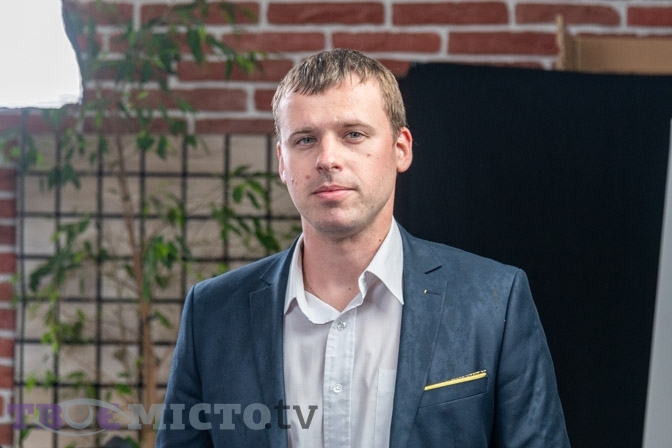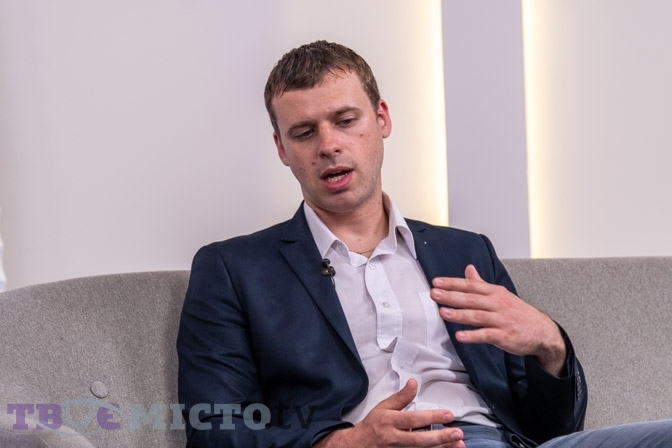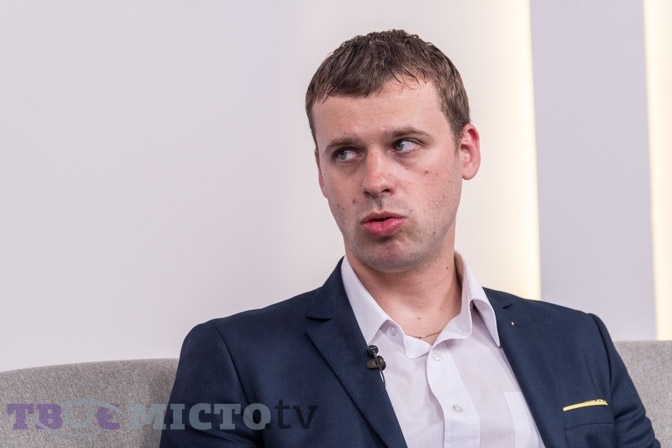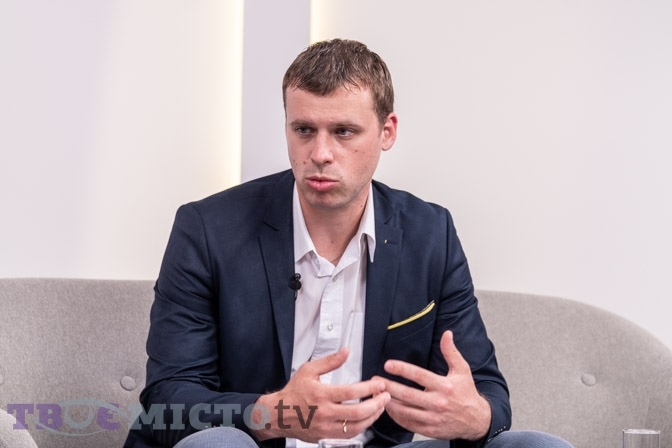
[For urgent updates please follow Ukrainian Freedom News on Telegram]

Could you please share with us, what types of transport you use in the current circumstances when you have to move around the city?
Like all residents, I use different modes of transport – public, mostly tram, car, also bicycle periodically on weekends. Fortunately, our city allows you to use different modes of transport quite comfortably.
If we talk about the changes that have taken place during the three months of martial law, how has the city’s public transport traffic changed, the redistribution of routes, the load on the roads?
From the beginning, there was an interesting dynamic: a huge number of refugees came to us. They stayed at the station or moved to other places. So we had to reorient the work of public transport to give many buses to transport these people to the border with Poland. In March, almost 45 buses ran daily from the station to the border and transported internally displaced persons free of charge. Our utility buses took more than 160,000 people there.
Then everyone observed complications in the movement on Horodotska – Chernivetska [streets near the Railway station]. The work to unload traffic and provide bandwidth had to take place there. In March, there was a problem with parking in the central part of the city, in particular because of people who came, did not know the streets and designated places for this, so they stopped where it was convenient. At the beginning, we instructed the inspectors not to fine them, printed information messages that in case of violation the car will be evacuated. And when this load began to increase, and the warning did not have a direct effect, we were forced to more actively involve parking inspectors.
As for the traffic in Lviv in general, it has not changed. We monitor it through cameras at the entrance and exit of the city. In March, traffic on the out-of-center section decreased, most drove to the centre, so we had to fine drivers and evacuate cars. One car parked in a public transport lane on Svobody Avenue could have created a traffic jam when public transport passed by a lane for private cars. The traffic jam could last as far as Kopernika street and beyond.
How many cars did you evacuate for the violation?
There were up to 200 evacuations in January-February. Then we evacuated cars that were parked in violation or obstructed traffic to the police penalty area on Konyushynna Street, and it’s quite far. In April, a penalty area was set up on the territory of our trolleybus depot and the distance to be towed by a tow truck was halved. Evacuation tariffs have also been raised so that drivers understand that when they stop at an intersection, public lane, or pedestrian crossing, they have to pay a large fine.
Read also: Everyone expected the boom in real estate purchases. What’s going on in the Lviv market
We now evacuate more than 550 cars every month. In recent days, the number of cars has increased and, accordingly, the number of evacuations has increased significantly, so I think there will be almost 600 evacuations. We also plan to involve third-party organizations with tow trucks, because we lack utilities to help us put the city in order.

As for the tariff, recently, before revision, it was 720 hryvnias. This tariff was approved in 2013. It is totally unprofitable, and the company did not earn on evacuation. Therefore, we have revised the tariff for evacuation services, now it is 2234 hryvnias for a car weighing up to 2 tons. Just indexed to the level of the figure approved in 2013.
Do all owners take away their evacuated cars?
It was thought at the beginning of the invasion that people were leaving the car en masse. But there are very few of them – up to 5%. Because there are no more active hostilities on the territory of the Kyiv region, Kharkiv, Chernihiv, Sumy, and people stopped coming from there en masse.
As It is known that recruitment of parking inspectors is currently being carried out. Is it still relevant?
Yes, we need people. Up to 55 street inspectors work in Lviv, and there are also inspectors who process data and print resolutions to regulate parking in the city.

How does this affect the economy? Does Lviv make money on this?
In fact, the first priority for us is to regulate traffic. At first, we only warned, and when we started to actively fine, the drivers began to understand that responsibility would be inevitable.
Now the work of inspectors is fully paying off. In May, the budget received 3.2 million hryvnias, and we expect 3.5 million hryvnias this month. There are many calls, complaints, appeals, but, in principle, we have a high level of payment. These revenues cover not only the cost of parking inspectors, but also the entire Department of Urban Mobility and Street Infrastructure.
There is another direction – a set of public transport controllers.
Read also: With pedestrians on the top. What’s Lviv’s new mobility plan?
Here the situation is similar. At the beginning of the Russian invasion, we suspended the work of controllers, only those we transferred to «Lvivavtodor» state company continued to work. They dealt with the equipment, checked its serviceability for the introduction of e-tickets. In March-April, we saw how much the revenue of «Lvivelectrotrans» decreases in the absence of controllers. If people do not see the control, they stop paying the fare. For example, if in March-April we had about 12 million hryvnias from ticket sales, then since May, when we hired Lvivavtodor controllers, we have formed joint groups with Lvivelectrotrans, provided an element of competition, and have already received 15.6 million hryvnias. In June, as of the 16th, there were 9 million, so we expect 17 million in June. The increase in fares on buses helped, after which many Lviv residents switched to trams and trolleybuses.
What is the main purpose of the controllers – to ensure the payment of travel or still a penalty?
We have a dynamic increase in revenue from 12 to 16 million. The main goal is not to fine a person, but to make passengers see the controllers and understand that they can be fined for unpaid travel. You know about the case when a man from Dnipro knocked out the controller’s tooth. So this work is necessary. Either we will co-finance the companies from taxpayers’ funds, because they are unprofitable due to non-payment of travel, or people who use transport and do not have benefits will buy tickets. That is, a controller is needed to ensure revenue. There is a revenue side of the fines themselves, but given the amount by which revenue increases if there is control, it is not comparable.

Are there any refugees among the new employees?
Yes. We have a certain turnover of personnel both in ATP №1 and in Lvivelectrotrans. More than 30 drivers are mobilized in each of these enterprises. One employee of Lvivelectrotrans died and one is a prisoner. The situation is not easy. Therefore, we are constantly updating the driver’s staff. Also recently, the company reconstructed the training plant on Troleibusna, 1 street: updated the interior and exterior. Drivers are trained in this plant, and from among the refugees as well – almost 16 people are involved – turners, locksmiths, drivers.
Have security requirements changed since the war? Probably, checking lost things, more meticulous attitude to people who move, video surveillance at stops.
We have really changed our approach and concept. At the beginning of the year, when there was no fighting, we adopted the Safe Lviv program and provided funds for it. I am glad that we managed to attract a contractor and install 197 surveillance cameras in the city, significantly increase the coverage rate and focus on security. We have surveillance cameras and face recognition cameras and license plates. In this way, we facilitated the detention of people who were observing strategic objects in the city, in fact saboteurs. We have established close cooperation with law enforcement agencies on rapid response.
Let’s return to the transport system: has the amount of transport on the routes been restored to the pre-war state?
Not 100 per cent. I have comments, in particular to private carriers. We have intensified the work of electric vehicles, increased the number of trolleybuses on routes. As part of a European Investment Bank’s project, two more five-section trams were to be launched this week. They are just undergoing the latest technical settings.
Read also: Public Forum: the routes to become short and straight. City’s plan to improve mobility
As for our municipal carrier ATP №1, after revising the tariffs in the direction of increase – up to 15 hryvnias and stabilization of the fuel situation, a number of routes were restored, large buses launched on the routes where they were not functioning before. Due to fuel economy and unprofitability, we were forced to run smaller buses on routes №8A and №61. But the situation remains difficult, we have constant fuel outages.

What are the fuel supply forecasts?
We try to form our reserves. If we talk about municipal ATP [transport company], it consumes 12-13 tons of fuel per day to ensure traffic. Private carriers just as much. Electric vehicles «worked» well here, we could intensify their work where buses could not go. Electricity as the main power source remains at the same level. Its cost has even dropped a bit, so we focus on electric vehicles.
If we analyze the appeals of Lviv residents, the most complaints are about the morning and evening traffic schedules. It’s hard to get home at half past eight in the evening. What does this have to do with anything?
With morning schedules there are actually fewer problems, with evening ones a little more. This is an illustration of the difference between private and public carriers. We oblige ATP №1 to operate evening flights, and their buses run for a long time. As for private carriers, the situation should be solved by switching to an e-ticket. Now, we are fined, it is said that to terminate a number of contracts due to non-compliance with the conditions, but still there is a problem. Therefore, I repeat, in this situation, the transition to an e-ticket will help, when we pay the carrier for kilometres. Then there will be an economic incentive to adhere to traffic schedules and not reduce the number of vehicles on the routes.
What are the prospects for implementing an e-ticket?
Martial law has complicated many things. Due to the Russian invasion, the Czech embassy recalled our contractor, who was working on the equipment in the second half of February. The team hurriedly left Lviv. Now, we work with them remotely. They did everything they could on their own. The points of reception and issuance of transport cards processed almost all applications. 120,000 applications were accepted and 112,000 cards were issued to beneficiaries. Of course, the rate of issuance has decreased, because some of the beneficiaries have gone abroad or do not want to come to the place of an issue with a card.
We plan to switch to the compensation of carriers under the validation acts at the end of July, when we will limit the possibility of travel on pension and other certificates. Because we see that in fact all those who had the opportunity to apply and get a «Leocard» have already received it. This, I hope, will significantly save the city budget.

Does Lviv receive additional transport? Part was handed over by Poland, there was an appeal to Germany…
We received up to 30 buses of various brands from Polish partners in the form of humanitarian aid. We direct them to provide the Armed Forces, military units on the front line. 14 buses of that number have already been handed over to military units so that they can transport personnel. At the same time, ATP №1 transports Ukrainian Armed Forces units to certain locations within and outside the community.
What about appealing to Berlin about trams?
There was a visit of German partners to Lviv. The chairman of the profile deputy commission of Lviv City Council, Ihor Zinkevych, communicates with them that there was an opportunity to transfer to us spare parts or KT4D trams. We are working together to get this help. Supply chains have been interrupted from the eastern regions, so we must look for alternatives. I cannot give more information until the decision is made by the German partners. But I want to inform you that Freiburg recently gave us temporary means of organizing traffic, for which we are very grateful. We are talking about a large number of turnstiles, temporary racks, vertical markings required for traffic control and temporary marking.
We recently saw a test of an autonomous trolleybus. Have you announced a tender for the purchase of such transport and do you plan to replenish the fleet with it?
Today, we do not have to talk about new purchases, there are no funds for it. Many international organizations have suspended cooperation with us within certain projects.
As for the trolleybus, it was a planned test. We handed over the №168 trolleybus car to Electron, where it was modernized, and it became an autonomous trolleybus. It is now being tested and certified so that it can be operated. This trolleybus should run 70% under the catenary and 30% outside it.
This is a good precedent, and I hope we will be able to multiply it. This is a real prospect. «Electron» qualitatively modernized it. We had a project under development for the purchase of new autonomous trolleybuses in cooperation with the International Finance Corporation, but the session has not yet supported this purchase, in particular, due to the interest rates offered by the bank. However, we are moving forward and understand that electric vehicles, in particular such trolleybuses, have a future.
Serhiy Smirnov spoke
Text: Khrystyna Hogol, translated by Vitalii Holich
Photo: Tvoe Misto/ Ivan Stanislavsky
Full or partial publication of the text without the written consent of the editors is prohibited and is considered copyright infringement.
Follow us on Facebook and Instagram. Lviv Now is an English-language website for Lviv, Ukraine’s «tech-friendly cultural hub.» It is produced by Tvoe Misto («Your City») media-hub, which also hosts regular problem-solving public forums to benefit the city and its people.


